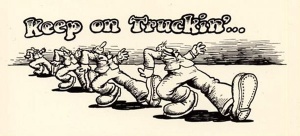Chapter 14
- Please keep these annotations SPOILER-FREE by not revealing information from later pages in the novel.
Page numbers refer to editions with 385 pages, where the story begins on page 3. Not sure if there are other editions with variant pagination. Please let us know otherwise.
Contents
Page 294
"But when he found out about Prairie...something else, something from his nightmares of forced procreation, must have taken over, because later, in what could only be crippled judgment, Brock was to turn and go after the baby and, noticing Zoyd in the way, arrange for his removal too."
This explains Vond's attack on Zoyd in Chapter 4 -- but note how "crippled judgment" buys off Pynchon's lack of clear motivation for this series of events.
Brock's nightmares are discussed on page 274. In Pynchon's symbolic system Vond is placed in opposition to life.
A great joke about the huge brick of weed that Zuniga plants at Zoyd's pad. "Let me guess," says Zoyd, thinking of Arthur C. Clarke and Stanley Kubrick's monolith, "2001: A Space Odyssey [1968]." "Try 20,000 Years In Sing Sing [1933]," replies Zuniga.
This joke is especially funny because both titles include numbers, and because both guys include scholarly references to the years the films were made. (Pynchon, of course, has been doing this throughout, but this is the first time he does it in dialogue).
A monolith of pot also appears in Inherent Vice. See pg. 33.
Page 297
"Following the wisdom of the time"
Pynchon refers, with vague disapproval, to the touchie-feelie California notion that men should "get in touch with their feelings" and, presumably, cry their little hearts out. However, Zoyd, who has gotten used to crying, is finding out that, in fact, big boys don't cry.
"Museum of Drug Abuse"
Sure, Pynchon.
Page 298
"gnathic index"
In craniology, the ratio of the distance from basion to prosthion to the distance from basion to nasion, expressed as a percent of the latter. Aren't you glad you asked?
"I know how to take care of Frenesi, asshole..."
Vond is unbearably cruel and sadistic in this interview with Zoyd. Unlike the hero of "Leader of the Pack," the lyrics to which Pynchon uses for a joke on p. 270, Vond is both bad and evil. What an asshole! And he really hates hippies — presumably for being childish. But who's really being childish here?
Page 299
"who feared nothing unless it was taking apart a transmission"
Vond's Scorpiopic self-destructiveness is compared to that of the "beer outlaws" of Zoyd's youth (see page 37). This observation is quite accurate: Only advanced automotive nerds can take transmissions apart (and get them back together again).
"those rectal spasms of fear"
Zoyd once again experiences this not-so-leit-but-definitely-motif in Vineland. (See also pages 10, 45, 116, 207.)
Page 300
"Not the Earth Brock was acquainted with"
A great line!
"...squealing, screaming guitar solos that defied any number of rules, that also lifted the blood and reassured the soul..."
Could be Jimi Hendrix. Or a description of Vineland. But mainly it gives Zoyd an idea that the "real" world still exists, and so will he.
Page 301
"she calls up one night..."
Vond seems interested in making sure that Frenesi won't be able to find Zoyd and Prairie. Of course this is contradicted by the "public act of craziness" that Vond has insisted Zoyd perform.
On pg. 304 it's Hector, not Vond, who describes the mental disability scam. He says they can keep track of him so long as he picks up his checks, just like one of Hector's Paid Informants. No nationwide publicity is required.
"I have her power of attorney, she gave me that even before she gave me her body..."
That is, Frenesi surrendered her identity to Vond first; bondage before intercourse. There's a distant echo here of Mississippi bluesman Robert Johnson's "Traveling Riverside Blues": "She got a mortgage on my body, now, and a lien on my soul."
Page 302
"the count at 5:30 AM"
Body count, that is — a basic security measure in prisons.
Page 303
"EPT"
Very likely El Paso, Texas. Pynchon has a scene in Against the Day set in El Paso, and even refers to the city by the same initials.
"Agustin Lara tunes"
Augustin Lara was born in Mexico City in 1896. He began composing songs in 1929, influenced by the popular dances and jazz forms of the 1930s and 40s. He composed well over 400 songs, many of them written for Mexican films. His best known song is probably "Granada." Lara died in 1970.
"conjunto"
Spanish for "small band," or "combo."
"los vatos de Chiques"
"Chicano dudes."
"palabra"
Equivalent in Spanish to "word".
Another instance of Pynchon using this slang is in Inherent Vice when Bigfoot Bjornson says it to Doc, while also then saying, "semi-palabra" and hooking three fingers like a fang. [will update with pagination]
Page 306
R. Crumb
R. Crumb is an American illustrator, author of subversive comics. He founded the Underground Comix movement, which wanted to distinguish itself from mainstream comics by including subversive, sexually taboo, and counter-cultural material. Crumb is the subject of a fascinating documentary called Crumb (1994).
Page 307
"Prairie kept waking up every couple hours, all the way back to her old baby ways."
This is true baby stuff. Is Pynchon a daddy? Consider also all the baby details, and Prairie's teenagerhood. This is hard stuff to get from a book, but with Pynchon's genius for bringing research alive you never know.
"Mucho Maas"
A pun, of course, on "mucho mas" ("much more", in Spanish). Also (and also "of course") ex-husband of Oedipa Maas, and one of the main characters in The Crying of Lot 49, in which Mucho is a DJ disgusted by his former incarnation as a used car salesman for a group called N.A.D.A., and becomes dependent on LSD.
Page 308
Trillium
"this pure specimen of young Californian womanhood of the period, ironed hair down to the small of her back, perfectly bikini-tanned, forever eighteen, sweetly stoned and surrounded by a patchouli haze" — A friend of Mucho Maas (a character in The Crying of Lot 49: the husband of Oedipa Maas), she greets Zoyd and Prairie at Mucho's townhouse in San Francisco. Trillium is a genus of perennial flowering plants native to temperate regions of North America and Asia. Trillium also shows up in Inherent Vice.s
"Paranoids concert at the Fillmore"
The Crying of Lot 49 A band featured in The Crying of Lot 49. Showing that his writing and his novels all take place in the same fictional universe.
"absquatulation"
Absquatulate is a coined word, apparently meaning to make off, or decamp. It also makes an appearance in Pynchon's 2006 novel Against the Day. The OED states it to have originated in the mid-19th Century and to have never had a serious application.
Page 309
"guest stash"
A special supply of smoke for visitors was not uncommon in the houses of serious weedheads at this time. However, since Zoyd can't find the guest stash at Mucho's house he has to roll his own. Bummer!
Lawrence of Arabia [song]
May not be intended at all, but I couldn't read this scene - Zoyd singing Prairie to sleep with this tune (before smoking his newly rolled J) - without thinking about the Skip Spence tune, "Lawrence of Euphoria," from his 1969 record, Oar. WIKI
Count Drugula... wearing joke-store fangs and a black velvet cape... scattering hits of high-quality acid among fans young and old...
The Count's product makes an appearance on pg. 283 in regard to head of A & R at Indolent Records.
Charles Manson
Although Manson is most famous for the horrible murders committed by his followers, he was, at one time, an aspiring musician. He even hung out with the Beach Boys' Dennis Wilson for a time and a recording of his music was released after his trial.
Wild Man Fischer
Mentally ill Los Angeles street musician who was discovered on Sunset Strip and signed by Frank Zappa to a record contract with Bizarre Records. Died June 16, 2011. Was also mentioned by Pynchon on page 155 of Inherent Vice.
Tiny Tim
An eccentric folk singer who played the ukulele and sang in a strangely beautiful falsetto voice. He's most famous for his version of "Tiptoe Through the Tulips." He also shows up in Inherent Vice.
Page 310
"unforeseen passion"
A good description of Mucho's love for cocaine.
"Dr. Hugo Splanchnick"
The entire Splanchnick sequence is immensely funny, including Pynchon's use of "snoot croaker" to describe the doc's specialty.
This bit is extremely Naked Lunch-esque.
Page 311
"stop-me-search-me VW bus"
The epitome of Sixties California hippie culture, which (wonderful to say) continues to survive, everywhere, to this very day.
"'Aw' said the dopers, the speech balloon emerging from their tailpipe"
All of a sudden, we're in 'toontown.
Page 312
Harry J. Anslinger
Harry Jacob Anslinger WIKI
"...me entiendes como te digo?"
Spanish for "Unnerstan' what I'm sayin'?"
Page 313
KQAS
There is a real KQAS 89.3 FM licensed in Warrenton, OR, but "KQAS! Kick-Ass 460 on the AM dial!" is fictitious. Nevertheless, it has a website, www.kqas.com. [1] Mucho Maas does the drive-time show. Thanks to whoever created this!
"I guess it's over..."
It seems likely that this is Pynchon delivering the "nut paragraph," as journalists call the central idea in a story. This dialogue seems heartfelt -- especially the stuff about the tube ("keep us distracted, it's what the Tube is for,") and rock 'n' roll ("just another way to claim our attention,") and "Soon they're gonna be coming after everything, not just drugs but beer, cigarettes, sugar, salt, fat, you name it, anything that could remotely please any of your senses...," and "It was the way people used to talk." (314) Yes, it was.
"Just please go careful, Zoyd"
Mucho has made much the same settlement with the establishment that Hub Gates has: joined the approved union, settled down, stopped making a fuss.
That you were never going to die... How are they supposed to control a population that knows it'll never die?
Like the Thanatoids?
Page 314
"The Best of Sam Cooke ... the sermon"
Sam Cooke was a singer-songwriter who was a pioneer of Soul music and was shot to death in Los Angeles in 1964. By "the sermon" Pynchon may mean Cooke's song A Change is Gonna Come which was released just after his death. Listen on YouTube here.
"Enjoy it while you can, while you're light enough for that glass to hold you."
Prairie on top of the Hip Trip pinball machine is a marvelous image capturing the fragility of the moment, the certainty of loss, age, death.
Great intro to Zoyd in Vineland.
Page 315
"the way a firearm is... finality...out to sea"
Suicide?
"one guitar and one harmonica, playing the blues"
This is a great metaphorical bit, with this exodus of hippies, signaling the end of a generation: the journey begins with them playing rock'n'roll and then reversing the process through history, until finally, back where it all began, a single person, playing the blues.
Page 316
Harbor of Refuge
The historical Harbor of Refuge is in Delaware. Here Pynchon seems to be creating the same idea for the west coast, however, a much less developed area over the years. Notice the mention of the Corps of Engineers marina on the following page.
Page 317
Eureka-Crescent City-Vineland megalopolis
Since traveling north on Highway 101, and not hitting Vineland until after Eureka, one could surmise that Vineland is located somewhere between Eureka and Crescent City, probably somewhere around Prairie Creek Redwoods State Park. The actual topography, with mention to Vineland Bay, suggests the Arcata area, possibly transplanted a bit further north, or even possibly a flip on Delaware Bay? [see page 316, and Harbor of Refuge].
The city of Arcata (see a satellite view here) approximately (but not perfectly) matches Pynchon's description of the city of Vineland. It even has the Art Deco bridges Pynchon describes. Arcata, of course, is in Humboldt County. However, the name Vineland and Pynchon's references to grape-growing suggest Mendocino County to the south, since Humboldt and Del Norte were too far northwest to be used for wine grapes in the 1980's and earlier. See also page 8. Ultimately, there's no reason for Pynchon to geographically match the real world. In his words from the Against the Day jacket flap, "Maybe it's not the world, but with a minor adjustment or two it's what the world might be."
For more on Arcata and marijuana, see this Reuters article.
Page 320
"spool tenders, zooglers, water bucks and bull punchers"
Logging jobs.
Page 321
"Many would be the former tripping partners and old flames who came over the years to deal with each other this way across desktops or through computer terminals, as if chosen in secret and sorted into opposing teams...."
Some folks get on Welfare, and others administer it. Another incarnation of the binary/preterite metaphor.
Page 322
Vineland the Good
The Vikings were the first to find and settle North America. They called it, "Vineland the Good". Following is an excerpt from Studies on the Vineland Voyages by Gustav Storm:
"Leiv Eriksson on his home-voyage from Norway to Greenland >>discovered Vineland the Good<<, an event which, in conjunction with his saving off the coast of Greenland a shipwrecked crew, got him the surname of >>the Lucky<<). In Icelandic manuscripts from the 14th and 15th centuries... derived partly from Latin sources... the noted traveller Nicholas, abbot of Thingeyre... con- taining special information... where mention is made of the countries west and south-west of Iceland, a passage on the discovery of Vineland, which accordingly can be taken as of very ancient date, and at any rate may come from Nicholas... >>South of Greenland lies Helluland, next Markland, and from thence it is not far to Vineland the Good, which some think joins Africa." GOOGLE BOOKS LINK
Also, see Vinland.
| Chapter 1 pp. 3-13 |
Chapter 2 pp. 14-21 |
Chapter 3 pp. 22-34 |
Chapter 4 pp. 35-55 |
Chapter 5 pp. 56-67 |
| Chapter 6 pp. 68-91 |
Chapter 7 pp. 92-106 |
Chapter 8 pp. 107-129 |
Chapter 9 pp. 130-191 |
Chapter 10 pp. 192-203 |
| Chapter 11 pp. 204-217 |
Chapter 12 pp. 218-267 |
Chapter 13 pp. 268-293 |
Chapter 14 pp. 294-322 |
Chapter 15 pp. 323-385 |


